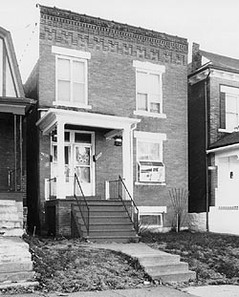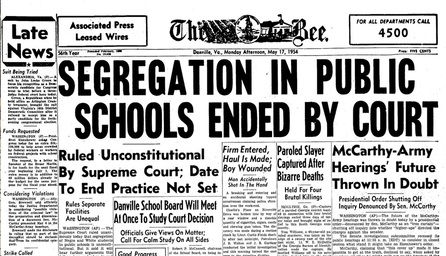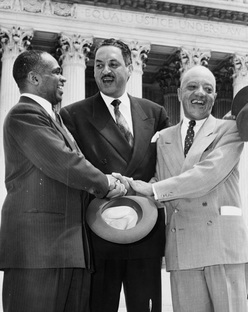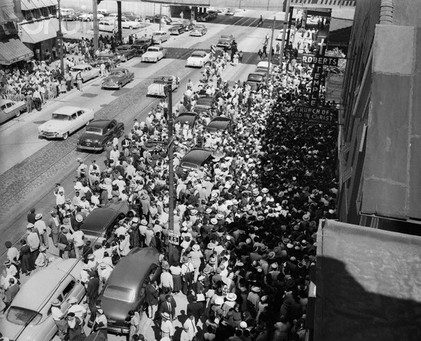National Context
Grassroots Civil Rights
The Ludlow Community Association was formed when the country was in turmoil over granting black people equal rights. A few key events and decisions defined the period and provided the larger context for the founders of the LCA.
This is a timeline of events in the civil rights movement prior to the formation of the LCA, many of them on a grassroots level. Local events are incorporated to illustrate what was going on in Shaker in relation to other national events during the time period. Scroll over dot to view event and click on it for more information.
Key Events and Decisions
Shelley v. Kraemer (1948)
"The Shelley case was a heartening signal for African Americans that positive social change could be achieved through law and the courts." |
In 1945, a black family named the Shelleys purchased a house in a Saint Louis neighborhood that held a restrictive covenant stating that blacks could not purchase a house. The Shelleys were sued, and their case was taken to the Supreme Court. Their 1948 ruling established that racial covenants could not be held on real estate.
"In Shelley v. Kraemer the Supreme Court reinforced strongly the 14th Amendment's guarantee of equal protection of the laws, which includes rights to acquire, enjoy, own, and dispose of property." - "Shelley House," We Shall Overcome |
Brown v. Board of Education (1954)
"Declaring that 'separate educational facilities are inherently unequal,' the Brown v. Board decision helped break the back of state-sponsored segregation, and provided a spark to the American civil rights movement." |
The Supreme Court's 1954 landmark ruling stated that segregated public schools were unconstitutional. This decision overruled the 1896 Plessy v Ferguson ruling that state-sponsored segregation was legal. Although the ruling didn't result in immediate school desgregation, Brown v Board set the precedent for integration in school systems.
|
Murder of Emmett Till (1955)
|
In 1955, a 14-year old boy by the name of Emmett Till was brutally murdered in Mississippi for allegedly flirting with a white woman. Till's murder was a display of the horrible racism and intolerance that occurred in much of the nation during that time.
"Standing as one of the most-heinous, race-motivated crimes in America’s history, the kidnapping and savage lynching of 14-year-old Emmett Till in Mississippi still stirs embers of anger in the minds of many who have endured racism and injustice. Considered a transformative moment in the African-American Civil Rights Movement, Till’s death shocked a nation and still resonates deeply in the minds of Mississippians and others abroad." |



